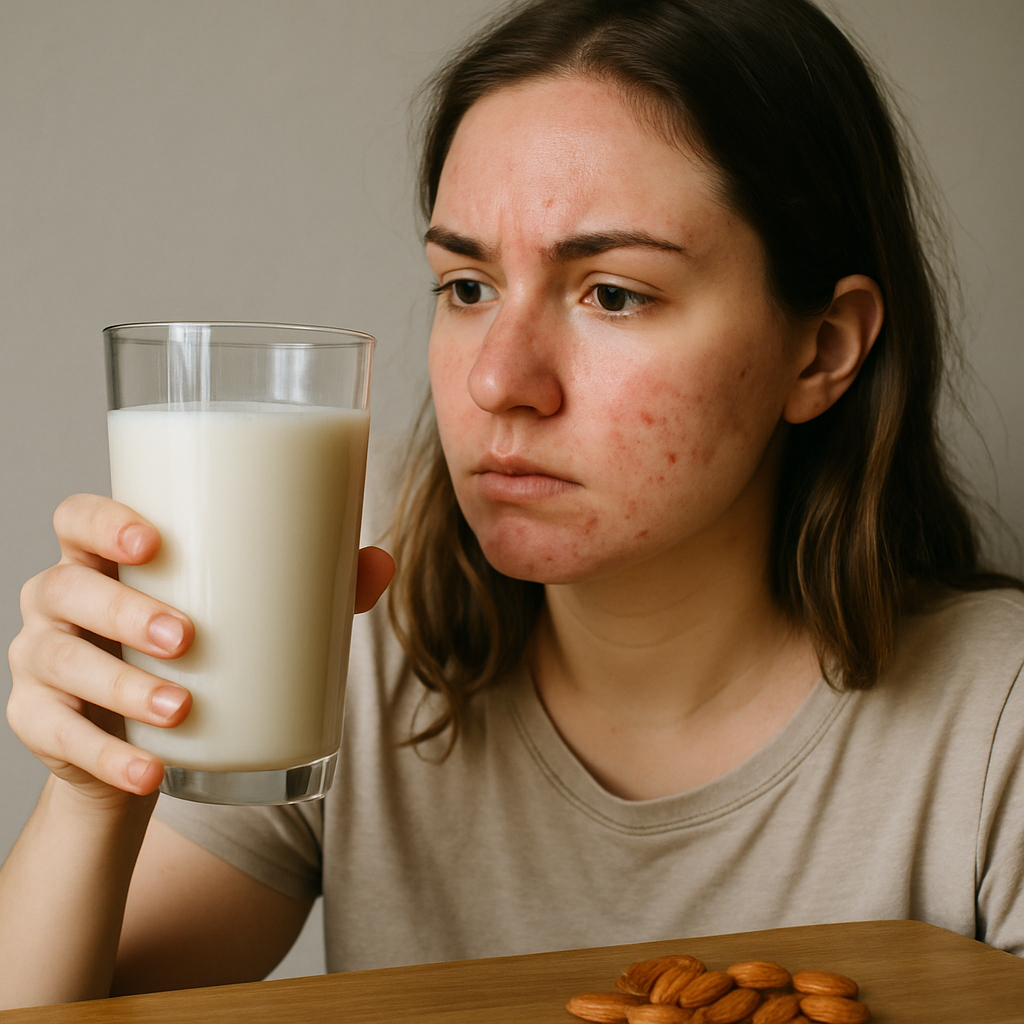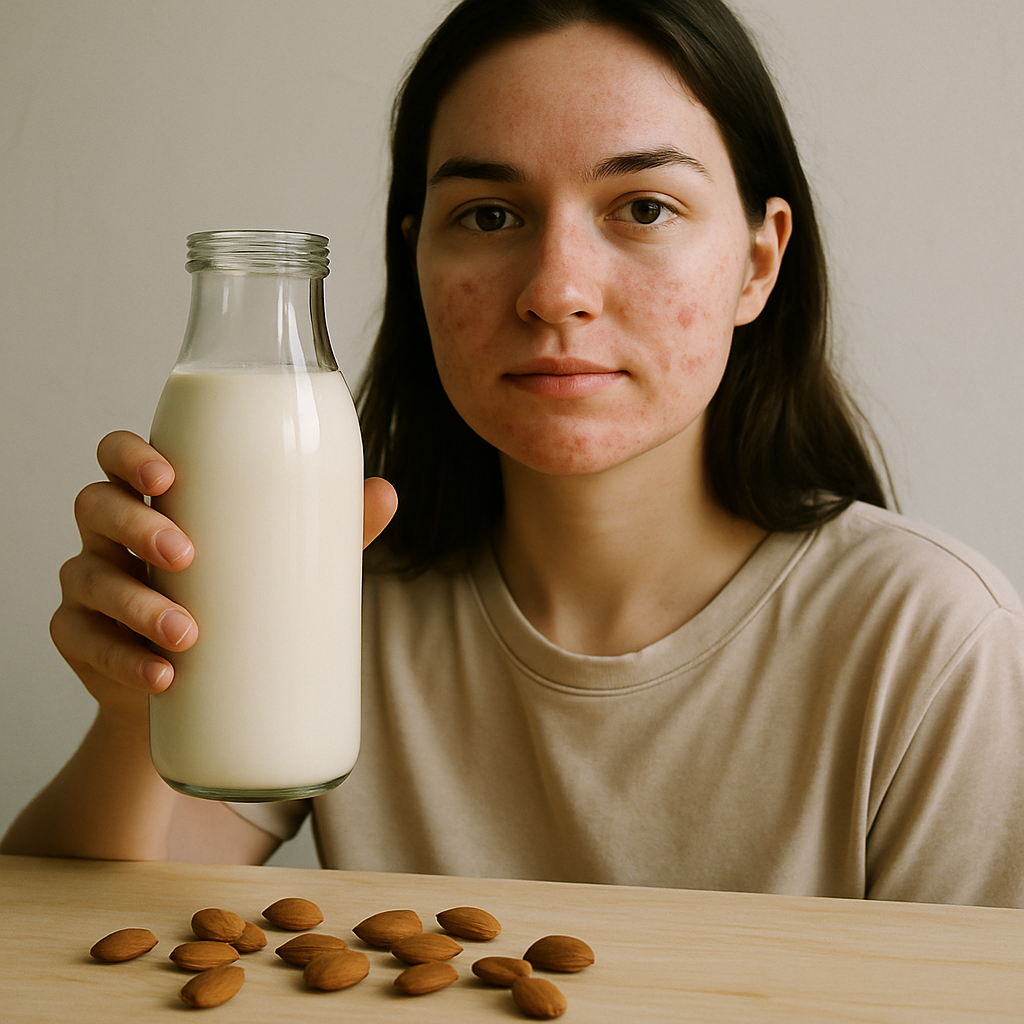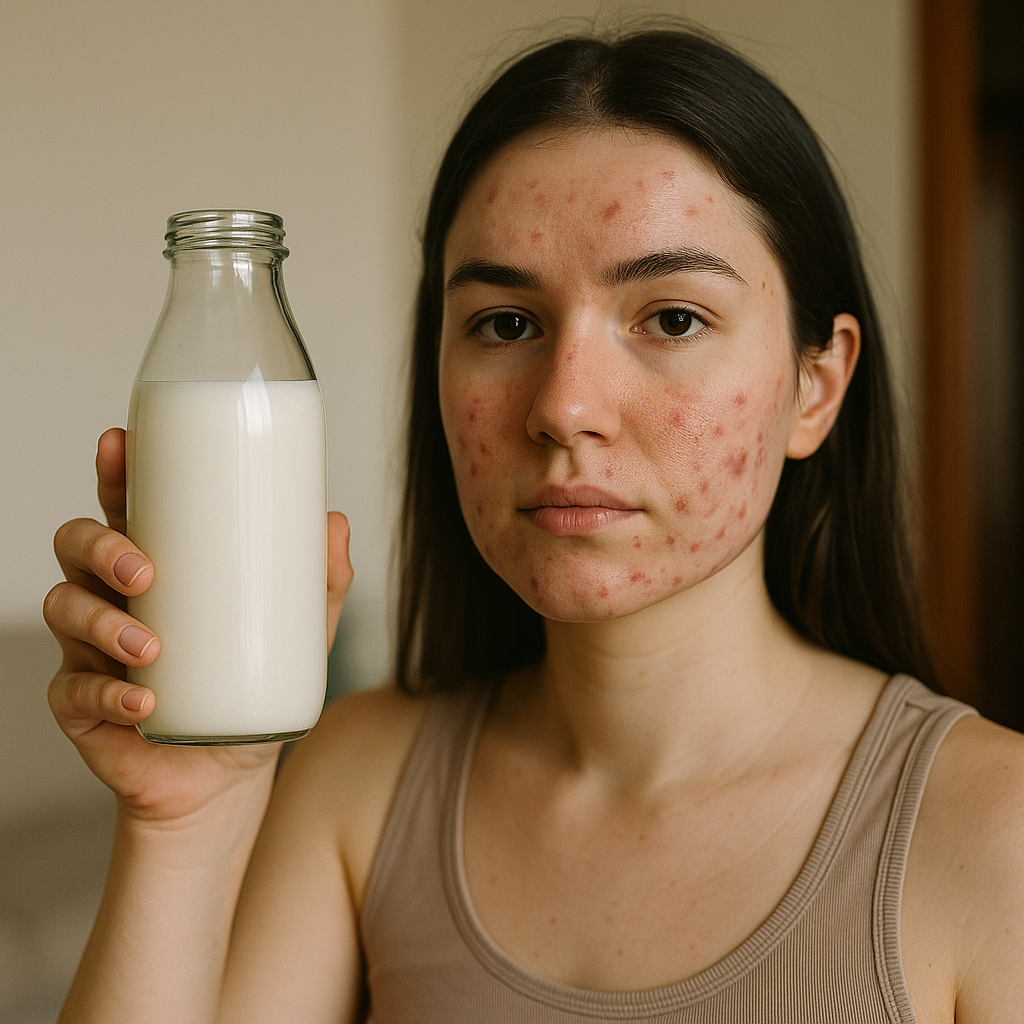Almond Milk And Acne: Skin Effects & Ayurvedic Insights

Almond milk has exploded in popularity lately — whether it’s in lattes, smoothies, or cereal bowls, it’s everywhere. But if you're one of the millions battling breakouts, you might’ve wondered: Does almond milk cause acne? Or maybe you’ve heard people ask, Can almond milk cause acne or help clear it up instead?
With all the buzz around dairy alternatives, it’s natural to wonder if switching from cow's milk to almond milk could help your skin — or make things worse. Spoiler: there's no one-size-fits-all answer. But don’t worry. In this article, we’re going deep. We’ll break down the science, explore Ayurvedic wisdom, and figure out whether almond milk is actually the best milk for acne-prone skin — or if you should be cautious.

Does Almond Milk Cause Acne or Help Prevent It?
Let’s just say it: almond milk and acne have a complicated relationship.
Ayurvedic View on Almond Milk and Skin Health
Ayurveda, the ancient system of Indian medicine, sees food as not just fuel — but as a tool for balance. Almonds, in general, are considered sattvic (pure) and nourishing. But processed almond milk? That’s a different story.
In Ayurveda, acne is often related to excess Pitta dosha, which governs heat and inflammation. Because almonds are warming by nature, consuming too much almond milk — especially with added sugars or artificial flavorings — might aggravate Pitta in some individuals. That could potentially lead to breakouts, especially if your skin is already prone to oiliness and inflammation.
So while almond milk might seem healthy on the surface, from an Ayurvedic perspective, it could go either way depending on your dosha balance and the type of almond milk you’re consuming.
Nutritional Impact of Almond Milk on Skin Balance
On the modern nutrition side, almond milk is dairy-free, low in saturated fat, and often enriched with vitamins like E and D — all of which are great for the skin. Vitamin E, in particular, is a known antioxidant that helps repair and protect the skin barrier.
However, not all almond milks are created equal. Some contain carrageenan, a thickener that’s been linked to gut inflammation in certain people. And gut health, as many skin experts now agree, is directly tied to acne.
Plus, flavored almond milk (especially vanilla and chocolate kinds) often come loaded with sugar — and excess sugar definitely doesn’t do your skin any favors. It spikes insulin, which can increase oil production and inflammation. And yeah, milk cause acne is a thing, but sugar in any form is just as guilty.
So... can almond milk cause acne? Technically, yes — especially if it’s sweetened, overly processed, or you're sensitive to some of the additives.

Don't wait or self medicate. Start chat with Doctor NOW
Almond Milk and Acne-Prone Skin: Pros and Cons
So is almond milk good for acne-prone skin, or should you avoid it?
Can Almond Milk Cause Acne for Some Skin Types?
Some people might notice breakouts after switching to almond milk. This could be due to a nut sensitivity, added sugars, or ingredients like gums and preservatives. While almond milk doesn't contain the hormones found in dairy (which are known acne triggers), it might still affect hormone-sensitive individuals in indirect ways.
This doesn't mean almond milk will cause pimples — but for some, yes, almond milk cause acne-like reactions. It's a good idea to track what you're eating and see how your skin responds.
Almond Milk for Acne-Prone or Oily Skin
On the flip side, if you're using unsweetened, clean-label almond milk, it might be a good choice. It’s low in calories, non-comedogenic, and doesn’t contain lactose — which some believe plays a role in acne development.
Still, everyone’s skin is different. Just because almond milk helps one person clear up doesn’t mean it won’t cause a flare-up in someone else. Trial and error — plus reading labels! — is your best friend here.

Comparing Almond Milk to Other Types of Milk for Acne
One of the biggest reasons people switch to almond milk is to avoid the skin drama that sometimes comes with dairy. But is almond milk actually the best milk for acne-prone skin? Let’s see how it stacks up.
Does Dairy Milk Cause Pimples or Inflammation?
If you're dealing with acne and still drinking dairy milk every day... we gotta talk.
Studies have shown a link between cow’s milk (especially skim milk) and acne. While the science isn't fully settled, many researchers believe that dairy may trigger acne in some people due to hormones and bioactive molecules present in milk. These can mess with your own hormones and oil production — and boom, pimples.
Plus, dairy increases something called IGF-1 (insulin-like growth factor), which is connected to higher sebum production and inflammation. More oil, more clogged pores, more breakouts.
So if you're wondering, milk cause acne? — for many people, yes, especially dairy milk.
In contrast, almond milk is naturally hormone-free. So on paper, it looks like a better option. But again, this isn’t a universal truth. If you react badly to almonds or the additives in your almond milk, you might just be trading one problem for another.
Best Milk for Acne-Prone Skin in Ayurveda
In Ayurveda, milk is usually considered nourishing and beneficial when it's organic, full-fat, and consumed warm with spices like turmeric or cardamom. But here’s the catch: if you're experiencing acne or other inflammatory skin issues, Ayurveda recommends avoiding cold milk and processed dairy.
For acne-prone folks, some Ayurvedic practitioners suggest goat milk (easy to digest), or plant-based options like oat or rice milk. Almond milk gets mixed reviews — again, because of its warming nature and potential to aggravate Pitta.
If you're using almond milk for acne, make sure it's:
-
Unsweetened
-
Free of preservatives, gums, and carrageenan
-
Made with high almond content (some brands only use 2% almonds — basically nut-flavored water)
And hey, if you're feeling extra fancy, making your own almond milk at home can be a game-changer. Fewer ingredients = fewer surprises.
Using Milk on Face for Acne: Myths and Truths
Now here’s a weird twist: while we talk so much about drinking milk and its effects on acne... what about putting milk on your face?
Milk-Based Skin Remedies
DIY skincare fans love to rave about milk as a natural cleanser or brightener. Raw milk has lactic acid, which can gently exfoliate the skin and help with pigmentation. Some people swear by it for soothing red or irritated acne-prone skin.
But — big but — if your skin is already breaking out, rubbing dairy milk on your face might not be the smartest move. It could clog pores or cause more irritation.
That said, almond milk is sometimes used topically, especially in natural skincare routines. It’s gentle, has vitamin E, and feels hydrating. But again, make sure it's the clean, unsweetened kind.
Which Milk is Safest for Topical Use on Acne Skin
If you're keen to try milk on your face for acne, go simple and go slow.
-
Raw goat milk: Often used in soap form, good for sensitive skin
-
Almond milk: Hydrating and mild, best used with calming ingredients like honey or turmeric
-
Avoid: Sweetened or flavored milks, anything with additives
Patch test first, and don’t use milk masks too often — once or twice a week is plenty. Overdoing it can actually make things worse, not better.
Conclusion
So, does almond milk cause acne? The answer isn’t black and white — more like almond beige. For some people, switching to almond milk can actually help reduce breakouts, especially if they’re ditching dairy in the process. But for others, almond milk can cause acne, especially when it’s full of additives, sugars, or if the person has a sensitivity to nuts.
Whether you’re drinking it or using it on your face, almond milk and acne don’t always get along. But they’re not sworn enemies either. The trick is knowing your skin, your body, and what you’re really putting into (or onto) yourself.
If you're breaking out and trying to figure out if milk is the culprit, it might help to eliminate all forms of milk (yes, even almond) for a couple weeks and track how your skin responds. Keep a journal. It sounds nerdy, but seriously — your skin will tell you what it likes and doesn’t like. You just have to listen. (And maybe stop chugging sweetened vanilla almond milk like it’s a smoothie.)
And let’s not forget: skincare isn’t just about what you drink or eat. It’s the whole lifestyle — stress, sleep, hormones, gut health, all that good (and not-so-good) stuff.
Still, if you’re looking for the best milk for acne, unsweetened, clean almond milk is a decent contender. Just don’t expect miracles — and be ready to pivot if your skin starts throwing a tantrum.
FAQs
Which milk is worse for acne?
Generally, dairy milk — especially skim milk — is considered the worst offender when it comes to acne. It’s linked to hormonal fluctuations and inflammation, both of which are common triggers for breakouts.
Sweetened plant-based milks can also be sneaky culprits because of the high sugar content and additives. If you’re acne-prone, go for unsweetened versions with short ingredient lists. The fewer things your body has to process, the better.
How to get rid of acne scars?
Ugh, the scars — almost worse than the pimples themselves. To fade acne scars, consistency is key. Here’s a quick rundown:
-
Use gentle exfoliants like lactic acid or mandelic acid (don’t overdo it tho)
-
Vitamin C serums can help with hyperpigmentation
-
Retinoids (prescribed or over-the-counter) can speed up skin cell turnover
-
Microneedling or chemical peels may help, but talk to a pro before jumping in
-
Stay out of the sun — seriously, scars get darker with sun exposure
-
And of course... hydrate and don’t pick! Picking is a one-way ticket to long-term scarring.
Final Thoughts
There’s no one perfect milk for everyone’s skin. What works wonders for one person might spell disaster for another. But if you’re trying to get clearer skin, it’s worth experimenting with your diet — and almond milk can be part of that experiment.
Just remember to choose the right kind of almond milk: unsweetened, minimal ingredients, and ideally homemade or organic. Watch how your skin responds over a few weeks. You might be surprised by what you discover.
👉 Have you tried switching to almond milk for your skin? Share your experience in the comments — it might help someone else on their skincare journey.
And if this article helped you or gave you a new insight, consider sharing it with a friend or on social media. Clear skin is a team effort.
Got any more questions?
Ask Ayurvedic doctor a question and get a consultation online on the problem of your concern in a free or paid mode.
More than 2,000 experienced doctors work and wait for your questions on our site and help users to solve their health problems every day.

